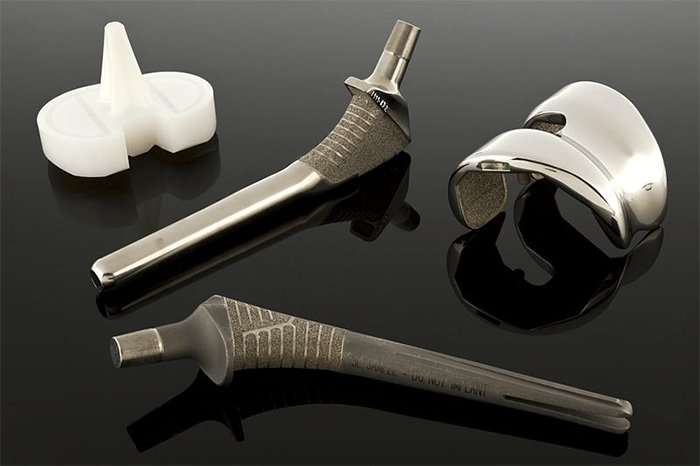Since the 1950s, titanium has been used in various medical applications by the medical industry. These include dental implants, shoulder joints, hearing aids and hip sockets. This strong and corrosion-resistant element has natural properties that make it reliable and fully biocompatible.
What is even more interesting about titanium is that it promotes osseointegration by physically bonding with the bone around which it is placed, without any need for an extra adhesive. Titanium implants can resist high energy forces without breakage, are inert to bodily environments, and last longer than many other materials.
Metals in Orthopedic Implants Through the Ages
Metallic materials have been traditionally used by humans to replace body parts and to treat fractures for more than a century. Earlier applications with aluminum, lead, gold and silver have since been abandoned because the materials were extremely weak for long-lasting uses.
Zinc, copper, nickel, iron and steel implants used between 1920 and 1950 resulted in adverse bodily reactions. Titanium initially become popular in the dental industry in the 1940s and rapidly found its way into orthopedics in the 1950s. Presently, titanium is the most sought after material for inner-body devices, internal fixation, medical instruments and prosthetics.
Properties of Titanium Alloys Used in Medicine
Titanium, in its pure form, has a low density, high strength and a high level of corrosion resistance. In addition, it is also non-toxic and non-magnetic - two properties that are specifically beneficial for use in biomedical applications.
Its elastic modulus and coefficient of thermal expansion resemble that of human bone. The most corrosive-resistant form of titanium on the medical market is pure titanium, which is often used when malleability and ductility are important. Alloys are used when strength-to-weight ratio is essential to the success of the implant. Most interestingly, titanium integrates very well to human bone and tissue.
Titanium 6AL4V and Titanium 6Al4V ELI are the most common alloys used in medical and dental implants. These are alpha-beta alloys containing about 90% titanium, 6% vanadium and 6% aluminum. They allow a high level of fracture resistance and work in harmony with the body to promote osseointegration.
Osseointegration: Titanium is Adhesive and Non-Corrosive
When an implant is inserted into the body, it is treated as an assault and the tissue surrounding it is also extremely sensitive. Moreover, titanium is completely inert because it naturally forms a protective oxide film upon exposure to oxygen. Since this metal is completely resistant to fluid and tissue corrosion, it will not be rejected by the body.
Due to its high dielectric constant, titanium bonds well with human bone. Unlike other types of biomaterials, titanium does not require adhesives to connect with tissue and bone and facilitates this process naturally - a benefit not found in any other metal. As soon the bond is formed, a very high force is needed to break it.
Heads and Shoulders, Knees and Toes
Surgical instruments such as laser electrodes, dental drills and forceps usually contain titanium because it is compatible with radiation, resistant to bacteria, durable yet non-corrosive and lightweight. Neurosurgical applications include acrylic, mesh and cranial plates. Children’s titanium rib cages enable expansion as the body grows.
Finally, titanium is the preferred biomaterial around the world for elbow and shoulder joint replacements as well as hip and knee replacements. Bone screws, staples, plates, staples, cables, and mesh made of titanium not only support broken bones but also aid fixation.
This information has been sourced, reviewed and adapted from materials provided by Matmatch.
For more information on this source, please visit Matmatch.

smartypants333 on August 28th, 2018 at 19:31 UTC »
My mom happens to be one of the 2% of people who are allergic to titanium. She had some dental implants that made her think she was dying over a 2 year period.
She had a bunch of weird symptoms, and of course doctors could find no cause. They kept telling her the symptoms were psychiatric.
Turns out, nope, she was allergic to the implants.
Then I remembered how 18 years earlier I got my nipples pierced with titanium hoops...I had to take them out a week later due to severe swelling, itching, fever, and pain. I thought I had an infection, but I was probably just allergic to the titanium too.
predictingzepast on August 28th, 2018 at 18:47 UTC »
..and for a very lucky few, Adamantium.
realjasnahkholin on August 28th, 2018 at 18:37 UTC »
This isn't entirely true. EVERY foreign body produces the foreign body response (FBR), and that includes titanium. A material's biocompatibility is determined not just by the severity of the FBR, but also by how the FBR affects the function of the device and how closely the material matches the properties of the original tissue. Titanium has similar-ish biomechanical properties to bone and does not prevent bone ingrowth, so is a pretty solid choice for orthopedic implants.
Edit: Also, bone ingrowth is more of a result of the relationship between the design of the implant and titanium than a property of titanium itself.
Source: am a biomedical engineer.